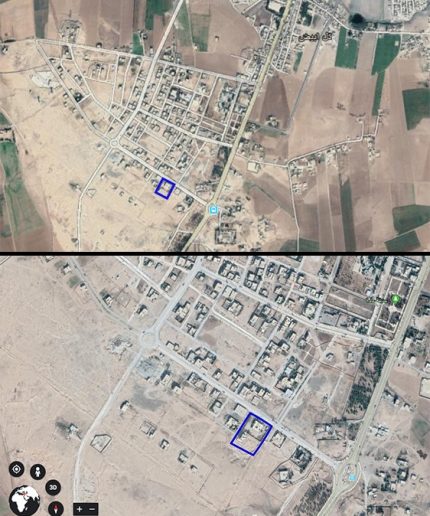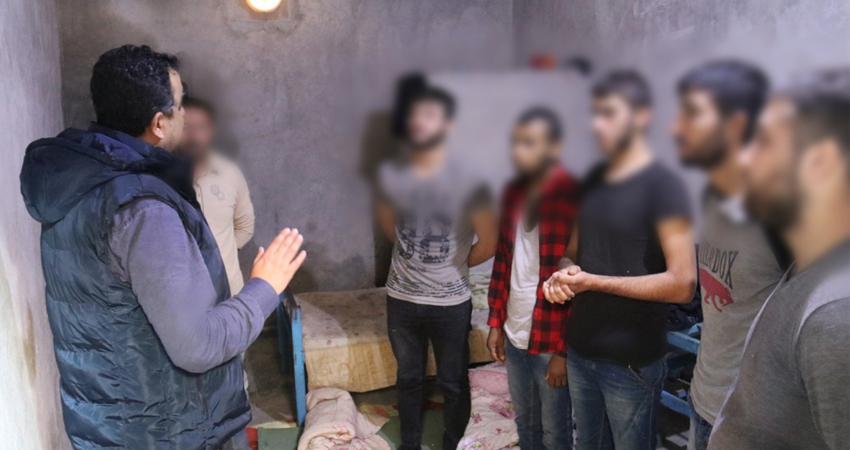STJ gained access to reliable information-based on accounts of witnesses and relatives of the detainees- confirms that the National Army of the Syrian Interim Government of the opposition, obtained forced confessions from the detainees with use of beatings and torture. Among those detained and tortured were three men and a woman along with other four people (all of them are from the Arab component) from the town of Tell Abiad, which was taken over by Turkey and allied armed opposition groups during “Operation Peace Spring” on October 9, 2019.
In addition, STJ verified the detention of at least 80 people by the National Army from the same region (all of whom are from the Arab component). They were arrested for performing the self-defense duty (compulsory recruitment) during the period of the Autonomous Administration’s control.[1] (equivalent to the mandatory recruitment in the government-controlled areas.).
The detailed accounts recounted torture and ill-treatment practices by agents of the National Army in newly created detention centers. For the preparation of this report, STJ spoke to eight people, including relatives of the detainees and witnesses to investigations. The sources, however, asked anonymity for them and for the detainees, who are still held as of the date of this report.[2]
Witnesses confirmed that the Levant Front/al-Jabha al-Shamia used the torture methods of waterboarding,[3] reverse shabeh,[4] and the wheel,[5] to extract confessions and also beat the detainees by hard and sharp objects. According to accounts, some detainees were tortured for more than six straight hours.
Sources told STJ that the National Army uses the government buildings it seized in Tell Abiad as headquarters or temporary detention and investigation centers to held the detainees before transferring them to Tell Abiad prison (36 ° 40’58.2 “N 38 ° 56’24.6 “E).
Ways of extracting confessions and torture methods used by the National Army are similar to those used by other parties to the conflict, including the security services of the Syrian government, which are a flagrant violation of human rights and possible war crimes.
The National Coalition for Syrian Revolutionary and Opposition Forces reported on its website on November 1, 2019 that a delegation from the General Authority for Detained and Missing Persons visited one of the National Army’s detention centers and commented that the detainees get good services.[6] That attests to the presence of detention centers led by groups affiliated with the National Army.
STJ has previously prepared a detailed report on other violations committed by the National Army in the town of Tell Abiad, including the seizure of private property and robberies, as well as the detention of civilians along the front lines.[7]
1. The detention and torture of three people, including a woman:
STJ field researcher interviewed four people, who witnessed the torture of detainees held by armed opposition groups, and the exertion of forced confessions from them. Our researcher also met relatives of some detainees, who were subjected to torture and ill treatment. However, STJ prefers to conceal the identities of the witnesses and detainees and not to disclose reasons for the latter’s arrest, to not to risk their lives.
The Levant Front detained seven people from their homes, including an epileptic and a woman, on the same charges. Those detainees were held and tortured in a headquarters of the Front in Tell Abiad and still in detention as of the date of this report.
The first witness to the torture and extracting confessions said:
“I was in the room of the interrogator, who is a commander of the Levant Front called Sheikh Juma. The detainee was sitting with us in the same room, but he was blindfolded, and marks of beating and torture were visible on his face and body. The investigator recounted to the detainee the confessions made by him and said: You have confessed to this. The detainee replied: I have confessed to this owing to the intense torture; I vowed to the torturers to do whatever they want if they stopped beating me. But I am innocent and did nothing wrong. The investigator said to him: I know that you are innocent, but I have to find a way to release you. The conversation ended here and they took the detainee out of the room.”
The second witness spoke about what he saw, saying:
“I was in a headquarter of the Levant Front, which was formerly a post office, but they did not allow me to enter the investigation room. A person at the headquarters called Abu Omar Marea-I knew later that he is a security commander- scolded the officers for allowing me to enter the headquarters. However, I stood next to the investigator’s room and heard the conversation between him and the detainee. The detainee said, I am innocent. I didn’t do anything wrong, so the interrogator asked him why you confessed then? The detainee replied: if you went under torture from two o’clock at night until ten in the morning, wouldn’t you confess anything in exchange for ending the torture? The interrogator asked him: and how did you know it was ten o’clock? The detainee said after the torture had ended, they brought me breakfast, and usually breakfast delivered at half past ten. ”
The witness added:
“The interrogator told the detainee that he had been filmed while confessing. The detainee told the investigator that he was filmed twice, and his confessions in the first video contradicted those in the second, as the officers asked him to tell a different story each time.”
The witness continues that he was shocked when he heard the rest of the dialogue between the investigator and the detainee, as the detainee was accused of committing serious acts in exchange for a very small amount of money, and though he is from a well-to-do family and it is impossible for him to carry out such actions in exchange for an amount less than 10% of his monthly income.
The third witness spoke about the arrest of a woman and her father by the Levant Front, saying:
“When they came to arrest the woman, her father tried to prevent them, so they arrested him also. The woman and her father were put in the same cell. They jailers used to allow the father to go to his home and return to the headquarters. And one day when he returned, they didn’t allow him in until they finished investigating his daughter; he saw torture signs on his daughter and she told him that they dumped her head with water several times until she confessed what they wanted.”
In other separate accounts, relatives of the detainees confirmed the use of several torture methods against the detainees, like waterboarding, reverse shabeh and the wheel. Witnesses also confirmed seeing marks of torture and handcuffs on the hands and bodies of detainees whom they were permitted to visit by the Levant From.
2. The mass arrest of 80 youths:
Since the National Army took control of the areas of Tell Abiad and Suluk on October 13, 2019. The armed groups of the Levant Front and the Ahrar al-Sharqiya, affiliated with the National Army, have carried out raids and arrests in search of people who had previously joined or worked with the Autonomous Administration and the SDF.
The two groups managed to arrest at least 80 young men (all of whom are from the Arab component) who had joined the ranks of the SDF by performing the self-defense duty (mandatory recruitment). The youths were held in unofficial detention centers (headquarters of the groups and the government buildings they seized), and then they were transferred to Tell Abiad Prison to be presented to the so-called military justice that usually looks into the cases of the detainees and decides them.

A satellite image shows the location of the Tell Abiad prison in the province of Raqqa (36°40’58.2″N 38°56’24.6″E).
According to a witness -he asked anonymity- the military judiciary based in a building in the Tell Abiad prison. A number of young detainees were released after they surrendered their light weapons (rifles), and those who did not possess a weapon, his family purchased a rifle and gave it to the military court in exchange for his release, and many detainees are still being held.
It should be noted that the arrests carried out by the National Army in the Tell Abiad region made in the same way of those carried out in Afrin, where detainees are forced to pay sums of money as bail or ransom in exchange for their release. STJ have already prepared detailed reports on these incidents.[8]
[1] For more info, see for example: “Recruitment under “Self-Defense” Increased in al-Hasakeh Province”, STJ, March 5, 2018 (last visit: November 27, 2019) https://stj-sy.org/en/447/.
[2] STJ prefers not to reveal the full names of the witnesses and the detainees or any further information, but it will share them with relevant mandated UN bodies.
[3] A form of water torture in which the interrogator put the detainee’s head in a large bowl of water for a certain period and remove it seconds before choking and subsequent death.
[4] The reverse shabeh position: the detainee’s hands tied behind his/her back and his/her feet tied to a rope before being suspended by the feet from the ceiling or by a device called “Blinko”, head-down.
[5] In this method the detainee placed within a tire, so that he becomes paralyzed, and then whipped. For more info, see for example: “On “the International Day in Support of Victims of Torture”, Syrian Survivors Talk about the Experiences of their Arrest and the Mental and Physical Effects”, STJ, June 23, 2017. (last visit: November 27, 2019) https://stj-sy.org/en/155/.
[6] “The General Authority for Detained and Missing Persons undertakes a field visit to the 123 “Ahrar al-Sharqiyya” Brigade of the National Army”, the official website of the National Coalition, November 1, 2019, (last visit on November 27, 2019) https://www.etilaf.org/all-news/news/%D8%A7%D9%84%D9%87%D9%8A%D8%A6%D8%A9-%D8%A7%D9%84%D9%88%D8%B7%D9%86%D9%8A%D8%A9-%D9%84%D8%B4%D8%A4%D9%88%D9%86-%D8%A7%D9%84%D9%85%D8%B9%D8%AA%D9%82%D9%84%D9%8A%D9%86-%D9%88%D8%A7%D9%84%D9%85%D9%81%D9%82%D9%88%D8%AF%D9%8A%D9%86-%D8%AA%D8%AC%D8%B1%D9%8A-%D8%B2%D9%8A%D8%A7%D8%B1%D8%A9-%D9%85%D9%8A%D8%AF%D8%A7%D9%86%D9%8A%D8%A9-%D8%AF%D8%A7%D8%AE%D9%84-%D8%B3%D8%AC%D9%86-%D9%84%D9%88%D8%A7%D8%A1-123-%D8%A3%D8%AD%D8%B1%D8%A7%D8%B1-%D8%A7%D9%84%D8%B4%D8%B1%D9%82%D9%8A%D8%A9-%D9%85%D9%86-%D8%A7%D9%84%D8%AC%D9%8A%D8%B4-%D8%A7%D9%84%D9%88%D8%B7%D9%86%D9%8A.
[7] For more info please see: “Raqqa: Violations Committed by the “National Army” in Tell Abiad”, STJ, November 18, 2019 (last visit: November 27, 2019) https://stj-sy.org/en/raqqa-violations-committed-by-the-national-army-in-tell-abiad/.
[8] For more info see: “54 Arrests, Including two Women, in Afrin during October 2019”, STJ, November 5, 2019 (last visit: November 27, 2019), https://stj-sy.org/en/54-arrests-including-two-women-in-afrin-during-october-2019/.

